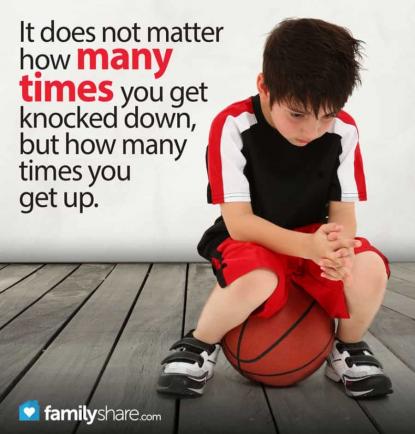
If you're a parent, you probably know the feeling.
It's the last inning in a tight game. The bases are loaded. There are two outs, and the tying run is at third base. Into the batter's box steps your son or daughter.
Pressure? Yep, you know it. Tension? Thick enough to cut with a knife. Nerves? Your heart is thumping the way it would at the end of a loopy roller coaster. And that's how you feel. Think of the poor kid at the plate!
There are really only two ways this situation can end. One, your son or daughter smacks a base hit and becomes an instant hero. Or two, things don't go so well at the plate and the game ends on the spot. In one case, you get to puff out your chest a little and maybe holler, "That's my kid!"� And in the other, you pull your hat lower on your forehead, put on a brave smile, and mumble two of the most dreaded words in sports: "Nice try."�
Both of my sons are fine athletes. One played basketball at the junior college level, and the other took a similar path but in a different sport: baseball. As a family, we've had some great moments cheering them on. And we've had more than a few tough times when the score didn't come out the way we hoped.
So how do you handle the sad faces, sighs, and maybe even tears when your kid's team loses?
There's no formula for turning what seems like tragedy into triumph, but experience has taught me a few things that might help.
1. Find something good to say about your child's performance
. It might be as simple as "You played awesome defense tonight,"� or "I liked the way you protected the goalkeeper today,"� or "I could tell you were really up for the game."� You can always find a way to compliment your child, no matter the final score or how well he or she played.
2. Show respect for the opposing team
. It's simple: The other team won, and usually because they played better. Comments such as "The Tigers were sure on their game tonight,"� or "That's the best I've ever seen the Lions play,"� can ease the sting.
3. Don't blame referees or poor coaching for the loss
I'm trying not to be a hypocrite, because I've certainly groused about officials and coaches, but criticizing a ref or coach just doesn't help your kid. If your child's team loses, it gives him or her the chance to assume some responsibility, to face up to difficult circumstances. That's a great lesson for life. Your son or daughter will take cues from your attitude. Make sure it's one worth emulating.
4. Provide perspective
Granted, your daughter or son probably doesn't want to hear "It's only a game,"� because right after a tough loss it seems so much more. But a few thoughtful words can go a long way at such a time. "It's OK. You had a great season,"� or "You'll have many more chances,"� or "You've had a lot of fun this year, so don't let one game spoil all the good memories."� It's an opportunity to teach them that no one gets out of life without experiencing defeat. Losing does allow for growth, albeit painful at times.
Boxing legend Muhammad Ali hit it dead on soon after losing his first professional bout. "I never thought of losing, but now that it's happened, the only thing is to do it right,"� he reflected. "That's my obligation to all the people who believe in me. We all have to take defeats in life."�
5. And finally, celebrate anyway
. Have some fun! Go out and get that cheeseburger and milkshake. Talk about the high points of the season. Laugh about it. Remember the good times. Figure out a plan for how you can be even better prepared for the next game or season.
Athletics can teach a lot of positive things about teamwork, fair play, sportsmanship, friendship, and sacrifice. And at the most elemental level, they're fun and help keep kids in good physical shape. The benefits far outweigh the drawbacks. It's why most of us encourage our children to participate. So we shouldn't allow a score that goes the wrong way to undermine all of those good things. We can all learn about life based on what happens on the playing field, even if your child's team comes up short. Sometimes, losing iswinning.

